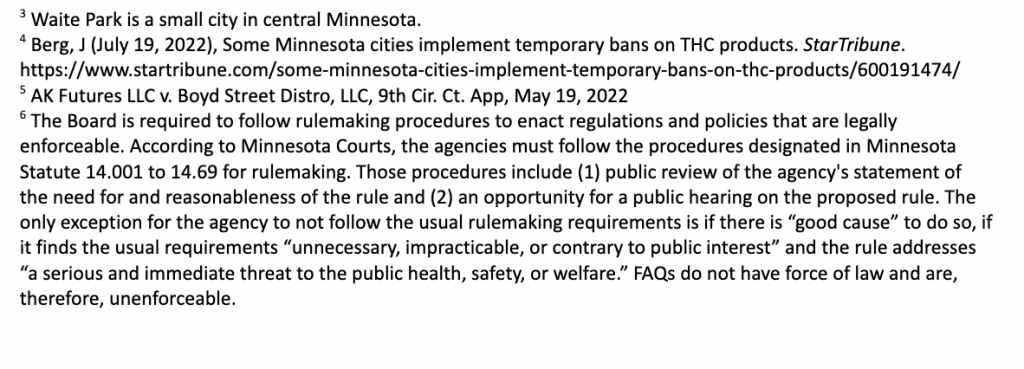AUTHOR
Susan Burns is a cannabis business lawyer in St. Paul, Minnesota and is listed among the Top 200 Cannabis Lawyers.
She may be reached at susan@sburnslegal.com.
THE DEVIL IS IN THE DETAILS: THE HIJACKING OF LEGAL CANNABIS FRAMEWORKS BY THOSE WHO CAN
A Minnesota tale of 10,000 mistakes?
In the State of Minnesota, during the last legislative session, in a uniquely utopian space in time, there came together elected officials from the Democratic Party and elected officials from the Republican Party to cooperate and pass a sane series of amendments to statutes that govern cannabinoids(1). These amendments also notably balanced consumer-protective measures with business-friendly predictability.
Much was written in the media about such a fabulous happening that resolved the interdepartmental and overzealous regulatory tussles and incorrect court opinions on what was and wasn’t legal regarding hemp-derived cannabinoids. This bi-partisan statutory miracle authorized the sale of hemp-derived cannabinoids in food and beverage, stated that hemp-derived products containing less than 0.3% THC were legal (even though they already were legal under the Farm Bill Act of 2018) (2), and provided that labeling requirements could be provided via a scannable or matrix bar code. It also required child resistant, tamper-evident, and opaque packaging; no packaging that is attractive to children; testing of the final product for cannabinoid content and mold, residual solvents, pesticides, fertilizer, and heavy metals, among other product safety measures. No more selling of 100 milligrams of Delta-8 to unsuspecting novices who unwittingly journeyed to the interwebs – without a computer. Just clean, clear, low-dose, legal product.
Of course, not everything was buttoned up in this legislation, which was fine. There were enough guidelines to go by, and there was room for legislators to go back next session and haggle over details and experience bi-partisan success again, courtesy of cannabis.
Life was good in the world of cannabis in Minnesota for a brief moment in time. Other states were jealous. Envious even.
But, as it happens, the legislators giveth and the legislators taketh away.
It appears that there was political fallout among uneducated naysayers, which caused some legislators to have egg on their face, which resulted in some amount of press-conferencing and back-pedaling, which ultimately caused the press conferencing legislators to abruptly announce, without having provided firm guidance or advance consultation, that it was up to cities to regulate everything, which in turn, opened a great big can of business-stability-eating worms.
As Garrison Keillor reminds us,
“We come from people who brought us up to believe that life is a struggle, and if you should feel really happy, be patient: this will pass.”
The consequences of this passing are that cities are scrambling to figure out how to manage this unexpected, out-of-the-blue responsibility for regulating an industry which has a steep learning curve. Some cities have considered outright bans, while others have issued moratoriums of various kinds to give them space to understand the industry to allow appropriate regulation. Quite understandable.
For example, the Waite Park(3) City Council considered a moratorium but opted to table any decision until it could learn how other area cities are handling regulations. As the police chief for Waite Park said, “It quite honestly caught a lot of us off guard. We really didn’t see it coming or have input on anything before it came along.”(4) Although the League of Minnesota Cities is scrambling to fill the void and establish guidelines for its 800 city members, it is a time-consuming effort, and there is no requirement that cities follow their guidelines. The result is unnecessary and unhelpful industry chaos.
Meanwhile, back on the regulatory ranch, just to add to the kafuffle, the Minnesota Board of Pharmacy (BOP) which somehow insinuated itself into assuming regulatory authority (even though it appears to exceed their statutory authority), and which had previously issued a legal opinion that Delta-8 was illegal (based upon what we aren’t sure – certainly not based on the 9th circuit’s considered legal opinion that D8 IS legal) (5), was busy working up a robust set of FAQs, rather than following legally prescribed rule-making processes.
Those FAQs declared all manner of things that were just plain contrary to the statute. And, of course, someone from the media got a hold of those FAQs (not sure how because they are very well hidden on the BOP website), which caused them to be published in the media, which caused much confusion in the business and enforcement community, and which even caused cities who were now in the middle of the maelstrom courtesy of state legislators to parrot the FAQs as though they had the force of law – which, plain and simple, they don’t.(6)
And so it is that the statutory amendments that provided business-friendly predictability for hemp-based businesses have been hijacked by those who created them and carelessly tossed to unsuspecting cities. Hemp-based businesses (over 50% of which are women and BIPOC owned), that spent considerable sums of money and scrambled to make sure they had products that complied with the new laws within a little over 30 days (no small feat), have once again, had the legal certainty rug pulled out from underneath them.
And now it’s a waiting game to see what each city will decide. Whatever the outcome, it won’t be 10,000 mistakes because there are only 853 cities. The only certainty hemp-based businesses have is that it will be a difficult journey to navigate compliance with 853 sets of regulations.
The sane solution? Create the Cannabis Management Office as proposed by Governor Walz and have professionals who are educated in the area create a regulatory system that provides economic stability for businesses, safety for consumers, and regulatory options for cities. In the meantime, Minnesota cannabis lawyers are busy trying to create legal order and business sense out of the chaos.
SOURCES & NOTES







